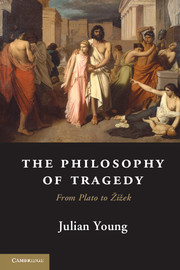Book contents
15 - Žižek
Published online by Cambridge University Press: 05 June 2013
Summary
Slavoj Žižek (1949–) is a Slovenian philosopher and cultural critic. Although he is a provocative rather than systematic philosopher, it is nonetheless possible, I believe, to discern a relatively systematic account of tragedy running through his scattered observations. These, it seems to me, concern two familiar matters: the question of what tragedy is and the possibility of tragedy in the modern (or postmodern) world. Žižek’s discussions are almost entirely focused on Antigone, which, while betraying his engagement with Hegel, actually ties him even more strongly to the French psychoanalyst Jacques Lacan (1901–81).
WHAT IS TRAGEDY?
Lacan’s discussion of tragedy – of, that is, Antigone – provides a useful point of entry into Žižek’s discussion. In his Ethics of Psychoanalysis, Lacan is at pains to distinguish himself from Hegel: contrary to a ‘thoroughly irresponsible’ suggestion that has achieved currency, he is not, he insists, a Hegelian, particularly not with respect to tragedy and above all not with respect to Antigone, where Hegel, he claims, is ‘at his weakest’. Where, he asks rhetorically, is any ‘reconciliation’ to be found in Antigone? (For an answer see pp. 121–3 above.)
- Type
- Chapter
- Information
- The Philosophy of TragedyFrom Plato to Žižek, pp. 254 - 262Publisher: Cambridge University PressPrint publication year: 2013

